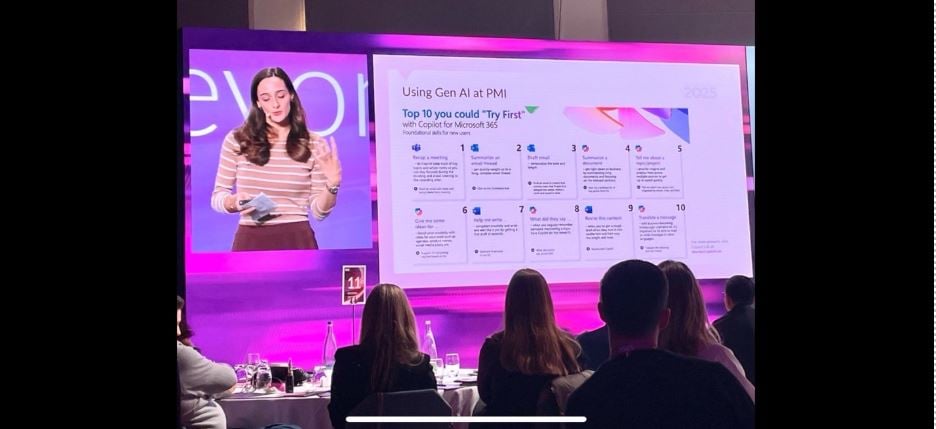Generative AI (GenAI) is a step change in the evolution of AI, with exciting potential. Companies with a comprehensive approach to AI will be best positioned to take advantage of the opportunities this rapidly evolving technology provides.
AI has been identified as an opportunity for PMI since 2023. In 2024, Leaders from our IT, Corporate Strategy, and People & Culture functions combined their efforts to advance AI implementation and increase awareness across the company. They sponsored the initiative by providing funds, attention, and key staff members, and by prioritizing AI education and experimentation.
First wave of AI deployment at PMI
In April 2024, PMI made Microsoft Copilot (the chatbot available in Microsoft Edge) available to all office employees, with approximately 20,000 active users. Encouraged by this success, we began rolling out Microsoft 365 Copilot. Initially, around 3,800 employees gained access to this tool, which further streamlined their workflow by integrating AI-powered assistance into their day-to-day tasks. Microsoft 365 Copilot is now available upon application for all office employees, ensuring that everyone can have the opportunity to explore the enhanced effectiveness and support offered by AI technologies.
We also launched a bottom-up initiative to identify AI use cases across various business units and functions within PMI. This approach empowered employees at all levels to contribute their insights and ideas, fostering a sense of ownership and engagement. By the end of 2024, this “test & learn” approach had generated 250 potential use cases. From these, five key themes emerged:
- Content creation, adaption, and summarization
- Content recognition and knowledge management
- AI assistants and interactive chatbots
- Ideation, insights, and innovation
- Digital personas
We believe these are all areas where AI could drive growth, enhance knowledge, and improve productivity for PMI. Acting on these opportunities required the development of common foundational capabilities. This meant creating the necessary infrastructure, tools, and skills to support the deployment of AI solutions across the organization.
By focusing on these foundational elements, AI technologies can be effectively scaled and integrated to maximize their impact and benefits where possible.
A people-first approach
We are building “competence and confidence” by empowering our employees to navigate the opportunities and challenges of AI through transparent communication and capability building.
Over the past year, PMI has invested in organizational awareness, conducting more than 100 sessions with senior stakeholders in functional and regional leadership teams, and large communities of office employees. Our online “AI Ready” learning pathway—designed by humans and powered by AI—aims to equip employees with the knowledge and skills to utilize AI effectively. As of December 2024, over 3,500 employees had participated in this program.
AI communities play a pivotal role in driving meaningful AI adoption at PMI. We set up an internal information hub that serves as a central resource, providing guidelines, training resources, and updates on AI initiatives. Employees are encouraged to join various discussion groups and forums dedicated to AI learning, knowledge sharing, and best practices. There is also a special interest group for AI enthusiasts, offering early access to AI tools and advanced training.
As we start to test targeted use cases in parts of the business, we are focused on driving adoption, adapting our processes and ways of working, and building specific capabilities. It is too early to understand how this AI revolution will impact roles and individuals at PMI, but our people-first approach aims to provide “early enough” and continuous upskilling and reskilling of our workforce as we continue to deploy more AI solutions.
Governance
To support our efforts, in mid-2024, we set up a GenAI Hyperscaler platform. This serves as a hub for all AI developments within the company, so that they are managed uniformly in compliance with applicable regulations and PMI policies. By using this platform, PMI can manage the various AI projects to adhere to cybersecurity protocols and achieve rapid development cycles. This centralized approach also promotes consistency across various AI applications, making it easier to maintain appropriate standards and efficiently scale successful AI products throughout the organization.
Further, we established a global governance process so that cases are evaluated across impact and risk homogeneously, enabling cross-learning. The process is continuously updated to adapt to the fast-changing GenAI landscape, particularly the emerging AI regulations and PMI’s own learnings. A monthly steering committee with senior leaders was established to focus on key enablers and risks. Additionally, we launched a Responsible AI workstream—a cross-functional endeavor led by the IT Technology Transformation team designed to define PMI’s responsible AI framework and toolkit and embed it into all our AI projects for effective AI deployment in accordance with the global governance process. This workstream will aim to mitigate, amongst others, risks such as:
- Business disruption
- Distribution of harmful content
- Amplification of bias
- Lack of transparency and explainability
- Model drift
Looking ahead
The plan is to discover GenAI’s positive impacts by applying it to our processes. We will first prioritize some of the processes that have been disrupted in other industries, learn, and then eventually scale as confidence in the technology and our ability to harness it grows. To do so, we have three focus areas:
- AI capability: To build a common pool of AI talent, partnerships, and technology for leaders across the business to leverage
- Internal Process optimization: To re-engineer or reinvent cross-functional processes with AI
- Executive focus: A senior management team-focused leadership approach of setting the foundations to make the most of AI as it continues to evolve




